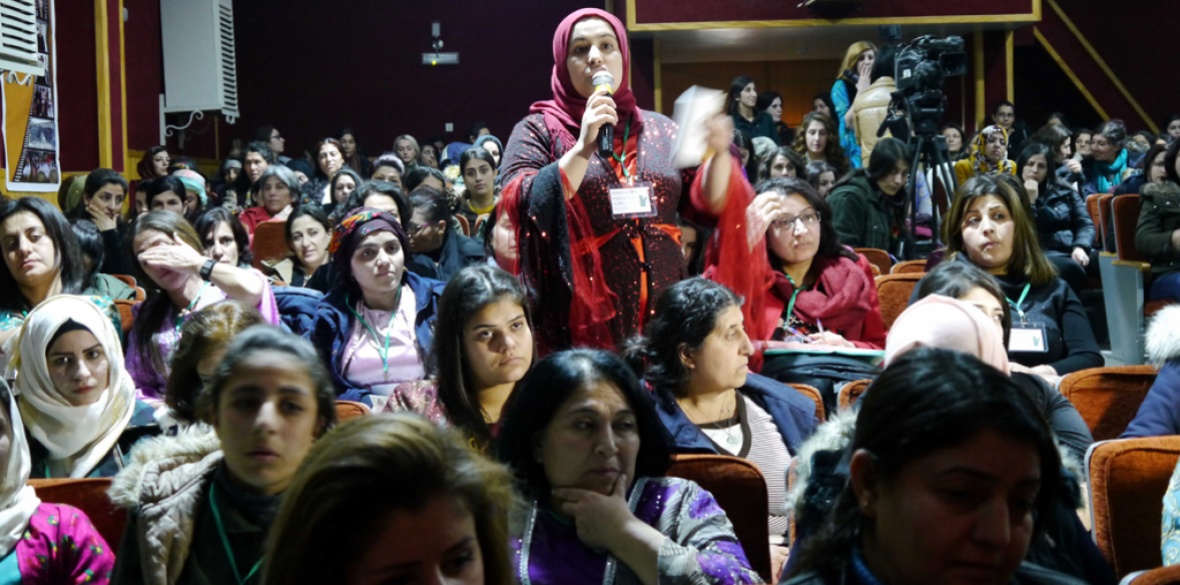This is the last article you can read this month
You can read more article this month
You can read more articles this month
Sorry your limit is up for this month
Reset on:
Please help support the Morning Star by subscribing here
EARLIER this month women gathered in the Democratic Federation of Northern Syria (DFNS) in the city of Derek for the first ever conference on jineology — a Kurdish term meaning “the science of women,” which is aimed at developing a sociology, and practice behind it, based on truth and equality.
Women from every ethnicity and religion of northern Syria, from all four parts of Kurdistan and across the world, joined the conference and expressed their excitement in participating in creating history.
On Saturday January 13, DFNS co-leader Foza Yosif made the opening speech in which she stressed the importance of jineology for the democratic revolution in society, as well as for the military effort to dismantle fascism.
All men and women across the DFNS — whether they’re working in democratic institutions or fighting in the the People’s Protection Units (YPG) or the Women’s Protection Units (YPJ) as well all students aged 16 to 18 — are educated on women.
An open discussion was then initiated, where women gave their views on the work done and suggestions for the future.
Criticisms here come in the form of aiming to positively develop each other as comrades, working together towards a democratic, free life and in this way several points were made which will contribute to the development of jineology’s effect on society.
One woman emphasised liberalism’s war on the youth.
“They are shouting about freedom,” she said, “but understanding it in an individualistic way.”
She suggested that the dogmatisms of education be broken in order to give the youth a true understanding of themselves and freedom.
Another woman said that since learning of jineology education, she decided to begin working. However, because of the patriarchal mindset of males around her, she still struggles every day to go to work and take an equal role.
She claimed that by understanding and practising jineology and through our empowerment and participation in society, together we will also give men their freedom.
Another woman said that the YPJ is seen like a bright star in the world and that jineology is also becoming to be seen like a star.
“While there are wars between and against almost everybody in the Middle East,” she said, “this conference has shown what democracy is, with the participation of all ethnicities and religions.”
But, she continued: “Until now, the basic problem is that the level of equality society needs has not been reached, as many people see others as smaller.”
She emphasised that “we are all special; everybody must live as they are, and in this way work towards freeing ourselves and each other.”
Her second point was that “we have not yet destroyed sexism, and this is not just the work of the YPJ, we can not do this only with weapons.
“If we do this, we will be an example for the whole world. We will create a huge belief and a lot of power for oppressed people everywhere.”
On the second day of the conference, documents were read on the research done in many areas, including the hidden history of the oppression of women, delving into thousands of years of societal changes, using archaeological artefacts excavated from many ancient towns across northern Syria, such as figurines of the mythological goddess of love and political power, Ishtar.
Research on societal problems and effects of recent history during the rule of the Syrian regime, the occupation of Isis, as well as the effect of the democratic revolution spreading across northern Syria were also presented.
The perspectives of jineology towards building a democratic society, including how to combat sexism within families, alternatives for economy and health, and self-protection of sexual, ethnic and religious identities were just some of the topics researched and read to the participants of the conference.
After each topic, women had the opportunity to criticise and propose areas of research for jineology. Many of them suggested more education be made available and centres be opened in various towns.
A Yazidi woman explained how they have always played a leading role in their society, and proposed that more research be done on the history of women in Shengal, which has a large Yazidi population.
Many women also shared their views on life before and after the revolution. One in particular remembered how when men used to talk politics, woman would be sent out of the room. They had no place in politics whatsoever.
Now women are represented at 50 per cent at every level in the democratic structures.
Another, coming from one of the many Kurdish families who were for generations denied citizenship under the Syrian regime, had no rights to study at school and had to pay bribes in order to do so.
They couldn’t even dare to think about studying in their own language.
Now she sees Kurdish songs on television and a conference of women discussing the future of a multinational, multireligious, equal and free society.
In the closing speech, it was said that this conference has shown how far jineology has come, but also that it is necessary to continue working.
She ended with a question posed by Kurdistan Workers’ Party (PKK) co-founder Abdullah Ocalan: “How do you want to live?”
Our reply: “We want to live free.”












